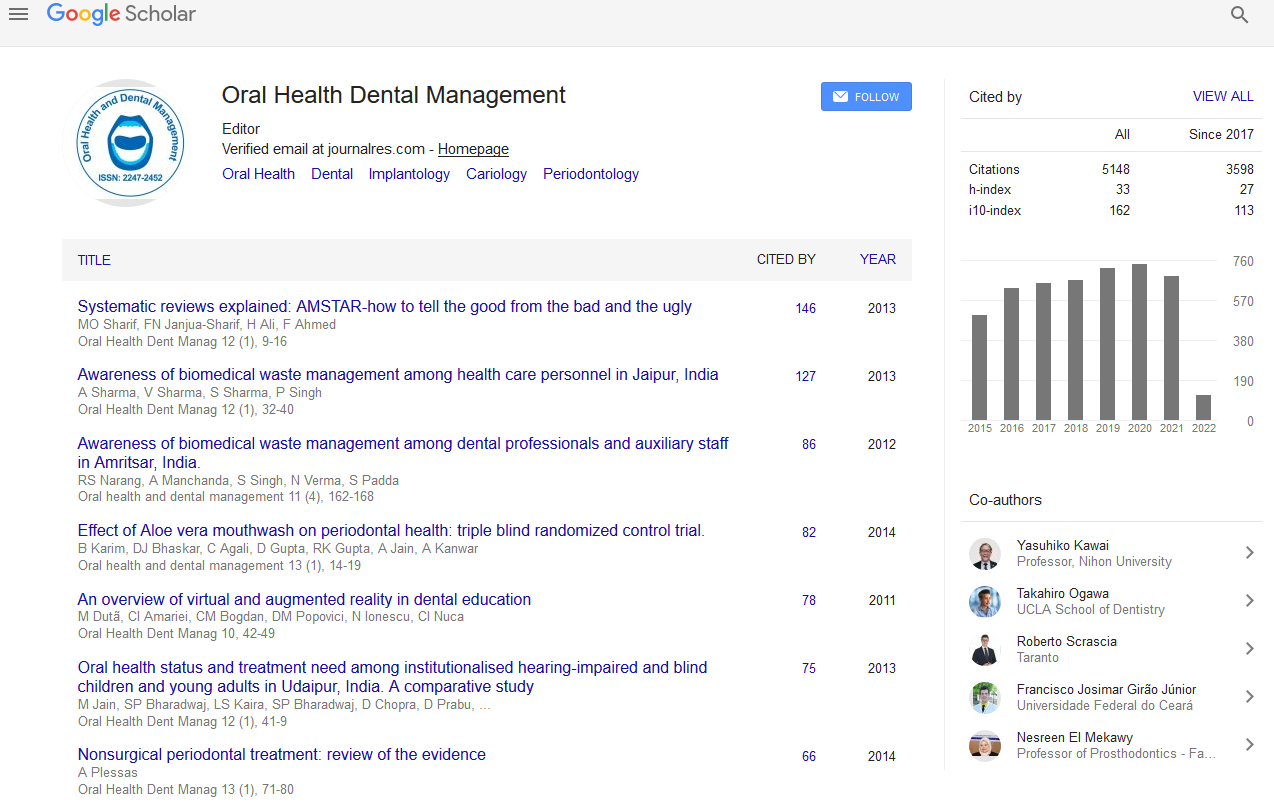Indexed In
- The Global Impact Factor (GIF)
- CiteFactor
- Electronic Journals Library
- RefSeek
- Hamdard University
- EBSCO A-Z
- Virtual Library of Biology (vifabio)
- International committee of medical journals editors (ICMJE)
- Google Scholar
Useful Links
Share This Page
Journal Flyer

Open Access Journals
- Agri and Aquaculture
- Biochemistry
- Bioinformatics & Systems Biology
- Business & Management
- Chemistry
- Clinical Sciences
- Engineering
- Food & Nutrition
- General Science
- Genetics & Molecular Biology
- Immunology & Microbiology
- Medical Sciences
- Neuroscience & Psychology
- Nursing & Health Care
- Pharmaceutical Sciences
Performance of dental faculty members and undergraduates in caries detection after ICDAS training
4th Asia Pacific Congress & Expo on Dental and Oral Health
July 27-29, 2015 Brisbane, Australia
Bhatia S, Parolia A, Smales F, Toh C G and Pau A
ScientificTracks Abstracts-Workshop: Oral Health Dent Manag
Abstract:
Introduction: ICDAS (the International Caries Detection and Assessment System) is a new approach for coding and recording the six stages of caries severity, varying from initial changes visible in enamel to frank cavitation in dentine. Objectives: To assess and compare the inter-examiner accuracy of the International Caries Detection and Assessment System (ICDAS) among dental faculty members and undergraduates after ICDAS training for dental caries detection. Materials & Methods: Twenty permanent human teeth, without sealants or restorations and with a range of ICDAS codes between 0 and 6, were selected from a pool of extracted teeth and cleaned. Digital images of selected surfaces were taken using the Shofu Camera. Three dental faculty members examined the teeth and the details of each code were discussed based on a published paper concerning ICDAS until a consensus was reached and thereafter the reference set was developed and validated by the international expert of ICDAS before initiating the training session. ICDAS training using E-learning program, extracted teeth exercise and photograph discussion was given to dental faculty members of different specializations and dental undergraduates. After the training the participants were requested to code the carious lesion using ICDAS on the selected extracted teeth. Thereafter, these codes were compared with the reference set coding, Kappa (weighted: Wkappa) statistics and Yates corrected Chi Square were used using SPSS 17.0. Results: For detection of caries the calibration indicated an inter-rater Wkappa ranging from 0.67-0.85 among dental faculty members and 0.57-0.75 among dental undergraduates. There was no significant difference in between the performances of dental faculty members and dental undergraduates using ICDAS for dental caries detection (p>0.05). Conclusion: The ICDAS can be learned and practiced by dentist of any specialization and dental undergraduates.However, it could be suggested that more time prac�ticing and training could help the study participants in developing their skills in the caries detection process.
Biography :
Dr. Shekhar Bhatia specializes in Conservative Dentistry & Endodontics and is presently working as Lecturer in International Medical University in Division of Clinical Dentistry. He pursued his B.D.S from Manipal University and M.D.S from J.S.S Dental College, Mysore with past experience as Senior lecturer in TMDCRC, India and lecturer in MAHSA University. He was appointed for the rank of Captain in Indian Army. He is a member of International association of Dental Research, Federation of Operative Dentistry of India, and Malaysian dental association. He has multiple publications in peer reviewed journals and has considerable experience in branch of Endodontics with more than thousands of Endodontic treatments done. He has special interest in Rotary Endodontics, single visit Endodontics, disinfection in Endodontics.

